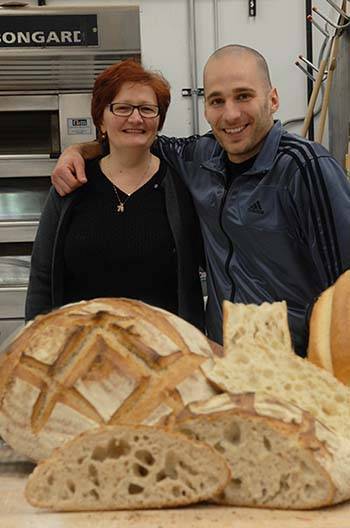
Two weekends ago, I was in Common Ground Food Coop in Urbana talking with Smile Politely contributor Sam Vandegrift, who was helping with the store’s Owner Appreciation Day. As part of the festivities, local vendors were invited to provide samples of their wares. Around noon a lanky, twenty-something man brought in baskets of gorgeous bread.
“Whose bread is that?” I asked Sam.
“Pekara’s,” he replied.
“Can’t be,” I said. “Nobody makes bread like that it in this town. It looks like something from San Francisco.”
A big part of what makes San Francisco’s breads so great is the local wild yeast. It is what makes San Francisco sourdough, San Francisco sourdough. But San Francisco isn’t the only place producing good local sourdough these days. As Sam and I learned, you can find it right here in Champaign-Urbana thanks to Pekara’s new head baker, Dusan Katic.
Choosing to make sourdough from wild yeast is choosing not to take any shortcuts. Far from the three-hour start to finish grocery store baguettes that flatten at the touch of a knife, wild yeast sourdoughs are breads that demand fermentations on the order of 18 hours. The doughs are wet and heavy, and can only be formed by hand. They must be slashed at just the right angle to reach their full potential when baking. And they must be baked at temperatures over 450 degrees for at least part of the time to become fully carmelized. These breads are dark. They look nothing like the ones that resemble Midwesterners’ pasty thighs in January and dominate too many of our local shelves. No — this is bread the way it was meant to be.
Knowing this, I was reluctant when Katic suggested I slash a couple of sourdough boules when I visited him in the bakery’s wholesale baking kitchen. In a matter of seconds I could easily undo hours of work. But, he is a patient teacher; no doubt because only two years ago, Katic found himself on the receiving end of a lot of lessons on bread.
Katic didn’t learn to bake bread in a bakery or at cooking school. He learned to bake bread in the French private military. The son of Serbian immigrants, Katic was bored with his job prospects after college. Not knowing what he wanted to do with his life, he joined the military and found himself stationed in Africa. Of course, European palates can only take so much, even those of soldiers. So as soon as they set up camp, the company built a brick bread oven to augment its prepackaged rations. Katic was one of several soldiers sharing the bread detail, which involved using local flour and wild yeast to make bread for the company and its French officers.
When he returned home, Katic continued to bake, e-mailing questions and pictures to a growing network of colleagues for tips and critiques. He still corresponds with them, for as good as his bread is — and it is really good — he believes it can always be better.
At the bake house you will see not only the bread for Pekara and its wholesale clients like Common Ground Food Coop and World Harvest, you also will see trays of Katic’s latest experiments, as well as entire loaves dissected just to check their crumb.
Katic’s passion for bread is matched only by that of Pekara’s owners, Ruzica and Dragan Cuk, also Serbian immigrants, whose first taste of American bread inspired them to open a bakery in self defense. The Cuks were in the process of expanding Pekara’s wholesale business when they met Katic, who is pursuing a degree in philosophy at the University of Illinois.
With the long rises and fermentations, Katic has had plenty of time to become philosophical about bread and life. “In the military we would gather around the fire to keep warm and talk about the bread as it came out of the oven,” he says. “Compania refers to who you break bread with. It is culture. When we lose culture, we have to connect in ways that are less personal and less satisfying, like Facebook.”
This kind of culture is so important that in 1993 France adopted a set of laws similar to Germany’s beer laws to protect its breads. Breads give communities and regions their identities, especially those made with local yeast. And while we are not in Champagne, Katic’s work is reason to be very glad that we live in Champaign-Urbana.
——
If you enjoyed this article, Smile Politely also recommends:
+ Baking bread is a revolutionary act
+ Polenta more versatile and and delicious than believed
+ Keeping local over winter with pumpkin scones
+ Learning to live on lentils








